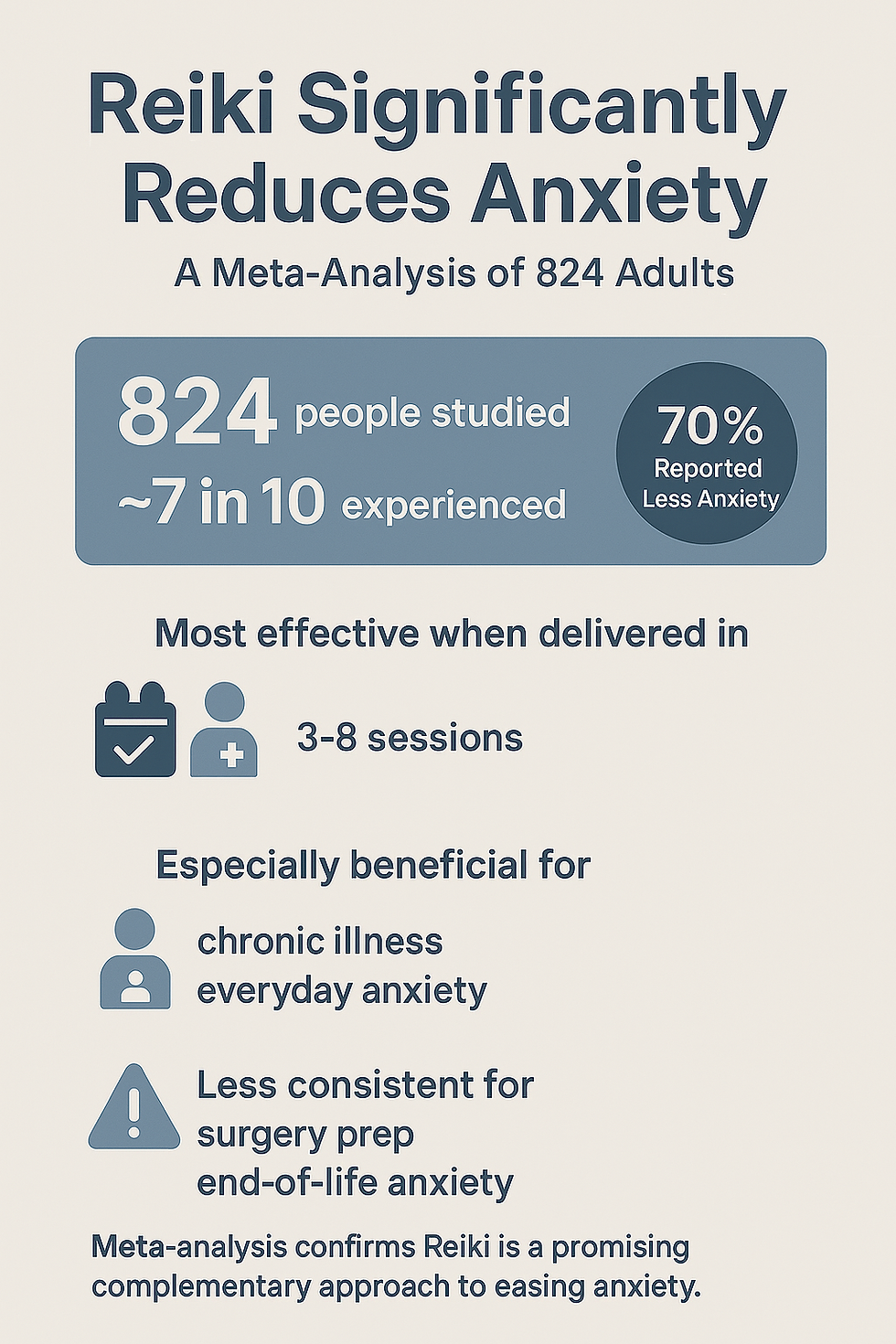Therapeutic effects of Reiki on interventions for anxiety: a meta-analysis - Reiki Dublin Kikoh Reiki
- Mike Mannix

- Sep 18, 2025
- 2 min read
Updated: Sep 26, 2025

Here’s a clear, plain-English summary of that study by Mike Mannix
Study: Xiulan Guo et al. (2024) — *Therapeutic efficacy of Reiki therapy in alleviating anxiety* (PMCID: PMC11170819)
What they did:
Researchers ran a meta-analysis of experimental and quasi-experimental studies on Reiki and anxiety. They searched PubMed, Web of Science, ScienceDirect, and the Cochrane Library for English-language studies where:
* Reiki was the treatment,
* participants were adults (healthy or with medical conditions),
* anxiety was an outcome measure.
Altogether they analyzed data from **824 participants**.
What they found:
* Across studies, Reiki significantly reduced anxiety (**standardized mean difference = –0.82; p = 0.001**). 70% reported less anxiety.
* The benefit showed up in both chronically ill patients and the general population.
* Number of sessions mattered: both **≤3 sessions** and **6–8 sessions** produced meaningful reductions.
Nuances:
Reiki Benefits Anxiety
* Reiki seemed most reliable for “health and procedural anxiety” (e.g., GI procedures, fibromyalgia, depression).
* Results were less consistent for **pre-operative** and **death-related** anxiety, possibly due to patients’ medical status, psychology, or expectations.
Bottom line:
Short courses of Reiki (a few sessions or up to \~8) appear to meaningfully ease anxiety for many adults, especially in chronic-illness or everyday settings, though effects in surgical or end-of-life contexts are mixed.

Abstract
Purpose: This study aimed to assess the therapeutic efficacy of Reiki therapy in alleviating anxiety.
Methods: In adherence to academic standards, a thorough search was conducted across esteemed databases such as PubMed, Web of Science, Science Direct, and the Cochrane Library. The primary objective of this search was to pinpoint peer-reviewed articles published in English that satisfied specific criteria: (1) employing an experimental or quasi-experimental study design, (2) incorporating Reiki therapy as the independent variable, (3) encompassing diverse patient populations along with healthy individuals, and (4) assessing anxiety as the measured outcome.
Results: The study involved 824 participants, all of whom were aged 18 years or older. Reiki therapy was found to have a significant effect on anxiety intervention(SMD=-0.82, 95CI -1.29∼-0.36, P = 0.001). Subgroup analysis indicated that the types of subjects (chronically ill individuals and the general adult population) and the dosage/frequency of the intervention (≤ 3 sessions and 6-8 sessions) were significant factors influencing the variability in anxiety reduction.
Conclusion: Short-term Reiki therapy interventions of ≤ 3 sessions and 6-8 sessions have demonstrated effectiveness in reducing health and procedural anxiety in patients with chronic conditions such as gastrointestinal endoscopy inflammation, fibromyalgia, and depression, as well as in the general population. It is important to note that the efficacy of Reiki therapy in decreasing preoperative anxiety and death-related anxiety in preoperative patients and cancer patients is somewhat less consistent. These discrepancies may be attributed to individual pathophysiological states, psychological conditions, and treatment expectations.
Keywords: Anxiety; Meta-analysis; Quality of life; Reiki therapy.
© 2024. The Author(s).
Conflict of interest statement
The authors declare no competing interests.




Comments